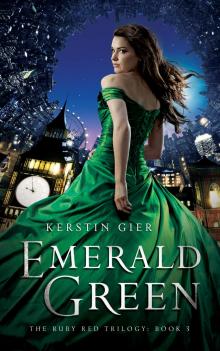- Home
- Kerstin Gier
Saphirblau Page 8
Saphirblau Read online
Page 8
Page 8
“Of course. ” Mr. Whitman waved the scarf cheerfully in the air as he walked along. “In fact, you can change your clothes there. You won’t be meeting anyone in the past. What year shall we send you to?”
“Makes no difference if I’m shut up in a cellar, does it?” I said.
“Let’s see, it has to be a year when you can land in … er, in the aforesaid cellar without any problems. That’s all right after 1945—for a few years before that, the cellars were used as air raid shelters. How about 1974? The year when I was born, a good year. ” He laughed. “Or shall we try 30 July 1966? That’s when England beat Germany in the World Cup final. But I don’t suppose you’re very interested in football, are you?”
“Particularly not when I’m holed up in a cellar without any windows, a long way below ground level,” I said wearily.
“It’s all done for your own safety. ” Mr. Whitman sighed.
“Hold on a moment,” said Xemerius, who was flying along beside me. “I can’t quite keep up with all this. Does it mean you’re going to get into a time machine now and disappear into the past?”
“Yes, exactly,” I told him.
“Then let’s go for the year 1948,” said Mr. Whitman happily. “The year of the London Olympic Games. ”
He was walking ahead, so he couldn’t see me roll my eyes.
“Time travel! Wow! Interesting girlfriend I’ve found myself!” said Xemerius, and for the first time I thought I detected a note of respect in his voice.
* * *
THE ROOM where the chronograph was kept was deep underground, and although I’d always been brought down here and led up again blindfolded, by now I had some idea where it was. If only because in both 1912 and 1782 I’d been allowed to leave the room without a blindfold. When Mr. Whitman led me, blindfolded now, away from Madame Rossini’s sewing room and along the corridors and staircases, the way began to seem quite familiar, and it was only at the end of it that I felt Mr. Whitman was taking an extra detour to confuse me.
“He really piles on the suspense, doesn’t he?” said Xemerius. “Why did they hide this time machine down in a deep, dark cellar?”
I heard Mr. Whitman talking to someone, then a heavy door opened and latched again behind us, and Mr. Whitman took off my blindfold.
I blinked at the light. A red-haired young man in a black suit was standing beside Mr. Whitman. He looked slightly nervous and was sweating with excitement. I glanced around for Xemerius. He was putting his head back through the closed door, just for fun, while the rest of him was here in the room with us.
“Thickest walls I ever saw,” he said when he reappeared. “So thick they could have walled up a bull elephant here sideways, if you see what I mean. ”
“Gwyneth, this is Mr. Marley, Adept First Degree,” said Mr. Whitman. “He’ll wait here for you to come back and then take you up again. Mr. Marley, this is Gwyneth Shepherd, the Ruby. ”
“It’s an honor to meet you, Miss Shepherd. ” The redhead made me a little bow.
I smiled at him, feeling a bit embarrassed. “Er … pleased to meet you, too. ”
Mr. Whitman was doing something to an ultramodern safe with a display of flashing lights. I hadn’t noticed it on my last two visits to this room. It was hidden behind a tapestry on the wall embroidered with what looked like scenes out of medieval fairy tales—knights on horseback with plumed helmets, ladies with pointy hats and veils obviously admiring a half-naked young man who had killed a dragon. As Mr. Whitman tapped a sequence of numbers into the keypad of the safe, Mr. Marley discreetly looked down at the floor, but you couldn’t make anything out anyway, because Mr. Whitman’s broad back hid the display from our eyes. The safe door swung open gently, and Mr. Whitman took out the chronograph in its red velvet wrapping and put it on the table.
Mr. Marley held his breath in surprise.
“This is Mr. Marley’s first sight of the chronograph in action,” said Mr. Whitman, eyes twinkling at me. With his chin, he indicated a flashlight lying on the table. “Take that just in case there’s any problem with the electric light. So you needn’t be afraid of the dark. ”
“Thanks. ” I wondered whether to ask for an insecticide spray as well. An old cellar was bound to be full of creepy-crawlies—and what about rats? It wasn’t fair, sending me off all on my own. “Please could I have a stout stick too?”
“A stick? Gwyneth, you’re not going to meet anyone there. ”
“But there could be rats—”
“Rats are more scared of people than vice versa, believe me. ” Mr. Whitman had taken the chronograph out of its velvet cloth. “Impressive, don’t you think, Mr. Marley?”
“Yes, sir, very impressive, sir. ” Mr. Marley stared at the device in awe.
“Sucking up!” said Xemerius. “Redheads always suck up, don’t you agree?”
“I’d have expected it to be larger, I must say,” I said. “And I wouldn’t have expected a time machine to look so like a mantelpiece clock. ”
Xemerius whistled through his teeth. “And look at those clunking great rocks! If they’re real, I’m not surprised this thing is kept in a safe. ” The chronograph did have gemstones of an impressive size set in it, glowing like the crown jewels in among the painting and writing on the surface of the strange device.
“Gwyneth has opted for the year 1948,” said Mr. Whitman, as he opened flaps and set tiny little wheels turning and whirring. “What was going on in London at the time, Mr. Marley, do you know?”
“The Olympic Games, sir,” said Mr. Marley.
“Show-off!” said Xemerius. “Redheads are always showing off. ”
“Very good. ” Mr. Whitman straightened up. “Gwyneth will arrive at twelve noon on the twelfth of August and spend exactly a hundred and twenty minutes there. Are you ready, Gwyneth?”
I swallowed. “I really do wish I knew … are you sure I won’t meet anyone there?” Not to mention rats and spiders. “When I was on my own before, Mr. George gave me his ring to take with me so I wouldn’t come to any harm. …”
“That was when you traveled back to the documents room, which has always been much used. But this room will be empty. If you keep quiet and don’t leave it—it will be locked, anyway—you definitely won’t meet anyone. Hardly anyone ever came into this part of the vaults in the postwar years. They were busy with reconstructing buildings aboveground all over London then. ” Mr. Whitman sighed. “An exciting period. ”
“But suppose, just by chance, someone does happen to come into this room at that time and sees me? I ought at least to know the password for the day. ”
Looking slightly annoyed, Mr. Whitman raised his eyebrows. “No one will come in, Gwyneth. Once again: you’ll land in a locked room, stay there for a hundred and twenty minutes, and then travel back again, and no one in the year 1948 will know anything at all about it. If they did, there’d be something about your visit in the Annals. And we don’t have time now to find out the password for that day. ”
“Not to Win but to Take Part,” said Mr. Marley shyly.
“What?”
“The password for the duration of the Olympic Games. It’s from the Creed of the Games: ‘The most important thing in the Olympic Games is not to win but to take part. ’” Mr. Marley looked awkwardly down at the floor. “I noticed because they’re usually in Latin. ”
Xemerius rolled his eyes, and Mr. Whitman looked as if he’d like to do the same. “Really? Well, there you are, then, Gwyneth. Not that you’ll need to know, but if it makes you feel any better … come here, will you?”
I went over to the chronograph and gave Mr. Whitman my hand. Xemerius flew down to the floor and landed beside me.
“Now what?” he asked excitedly.
Now came the uncomfortable bit. Mr. Whitman had opened a flap on the chronograph and put my forefinger through the opening.
“I think I’ll just hang on to you,” said Xemerius, clinging to my neck from behind like
a monkey. I ought not to have felt anything at all, but in fact there was a general impression of someone putting a wet scarf around me.
Mr. Marley’s eyes were wide with tense interest.
“Thanks for the password,” I told him, and made a face as a sharp needle pricked my finger and the room was filled with red light. I clutched the flashlight, colors and the figures of people swirled around before my eyes, and a jolt passed through my body.
23 June 1542, Florence. I am asked by the leader of the Congregation to inquire into a case that calls for the utmost discretion and delicacy. It is also extremely curious. Elisabetta, the youngest daughter of M. ,1 who has lived for the last ten years in strict seclusion behind convent walls, is allegedly with child by the Devil and will give birth to a succubus. 2 On visiting the convent, I was indeed able to convince myself of the girl’s possible pregnancy and of her somewhat confused state of mind. While the Abbess, who enjoys my full confidence and who appears to be a woman of sound mind and good understanding, does not exclude a natural explanation of the phenomenon, the girl’s father expresses suspicions of witchcraft. He claims to have seen, with his own eyes, the Devil in the shape of a young man embracing the girl in the garden, and then dematerializing in a cloud of smoke, leaving behind a slight smell of sulphur. 3 Two other girls at school in the convent apparently bear witness that they have seen the Devil several times in the company of Elisabetta and that he has given her gifts in the form of valuable jewels. Improbable as the story may sound, in view of the close connection of M. with R. M. 4 and various friends in the Vatican, it is difficult for me to cast doubt publicly on his sanity and accuse his daughter merely of unchastity. Beginning tomorrow, I am therefore about to conduct interrogations of all involved.
FROM THE RECORDS OF THE INQUISITION AS DRAWN UP BY FATHER GIAN PETRO BARIBI OF THE DOMINICAN ORDER
ARCHIVES OF THE UNIVERSITY LIBRARY, PADUA (DECIPHERED, TRANSLATED, AND EDITED BY DR. M. GIORDANO)
THREE
“XEMERIUS?” The wet-scarf feeling around my neck had gone away. I switched the flashlight on. But the room where I’d landed was already lit by a dim electric bulb hanging from the ceiling.
“Hello,” someone said.
I spun around. The room was full of a jumble of crates and pieces of furniture, and a pale young man was leaning against the wall by the door.
“Not to Win but to T-take Part,” I stammered.
“Gwyneth Shepherd?” he stammered back.
I nodded. “How do you know?”
The young man took a crumpled piece of paper out of his pocket and held it out to me. He looked just as excited as I felt. He was wearing suspenders and a small pair of round-rimmed glasses; his fair hair had a side parting and was combed back with a lot of hair cream. He could have been in one of those old gangster films as the precociously clever but harmless assistant to the hard-boiled chain-smoking detective who falls for the gangster’s moll, the girl with all those feather boas who always gets shot in the end.

 Emerald Green
Emerald Green Ruby Red
Ruby Red Saphirblau
Saphirblau Dream On
Dream On Just Dreaming
Just Dreaming Sapphire Blue
Sapphire Blue A Castle in the Clouds
A Castle in the Clouds